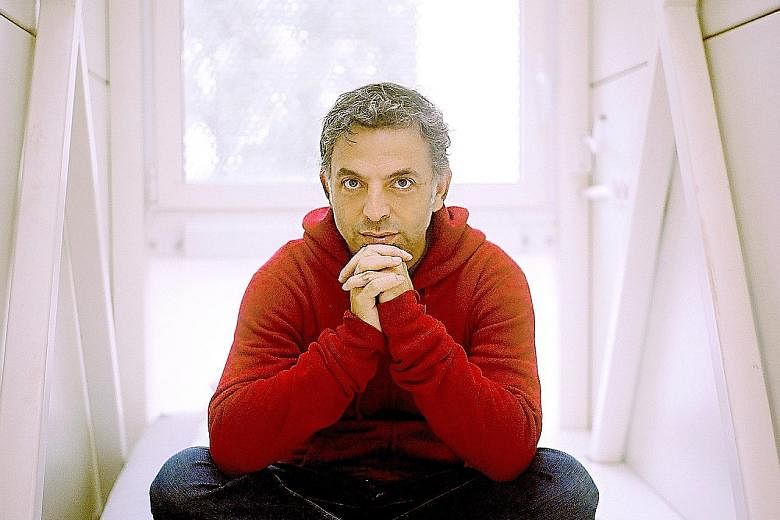Not everyone gets to have a house named after him, let alone one of the narrowest houses in the world.
But such is Israeli author Etgar Keret's repute for short fiction that it made sense for him to lend his name to the Keret House, wedged in between two other buildings in Warsaw's old Jewish ghetto. Built in 2012 by architect Jakub Szczesny, it measures 133cm at its widest point.
Keret calls the house, now a temporary homestay for travelling writers, a "beautiful tribute", both in its creation of a functional home in the same proportions as his stories, and in reconnecting his family to Poland, 70 years after they were killed or exiled in World War II.
The Jewish writer and film-maker, 50, is known for doing more with three or four pages than many can achieve with a hundred. His short story collections include The Bus Driver Who Wanted To Be God And Other Stories (2004) and Suddenly, A Knock On The Door (2012).
He finds writing short stories as instinctive as blinking or sneezing. "When two friends meet, they tell each other stories, not novels," he tells The Straits Times in an e-mail interview.
Keret, who will be in town for the Singapore Writers Festival this week, has received accolades such as the Chevalier (Knight) Medallion of France's Ordre des Arts et des Lettres and the Charles Bronfman Prize, which recognises Jewish humanitarian work. His books have been translated into more than 40 languages.
He is known for blending the surreal with the believable in his stories and for finding humour in the darkest places. "I feel that humour has always been the weapon of the weak," he says. "It is to protest against a reality which you cannot change but, at the same time, cannot accept."
-
BOOK IT/ THE ABSURDITY OF EVERYDAY LIFE: A TALK BY ETGAR KERET
-
WHERE: Play Den, The Arts House, 1 Old Parliament Lane
WHEN: Sunday, noon
ADMISSION: Festival pass event, $25 from Sistic (call 6348-5555 or go to www.sistic.com.sg)
-
THE ROLE OF DARK HUMOUR
-
A panel discussion between Etgar Keret and Irish writers Rob Doyle and Julian Gough
WHERE: Play Den, The Arts House
WHEN: Saturday, 11.30am
ADMISSION: Festival pass event
War has shadowed much of Keret's life. The son of Polish survivors of the Holocaust, he spent three years in the Israeli military. It was during this time, when he had to surrender individuality for a rank and uniform, that he began writing.
"I found out very early that whenever I tried to be myself in the army, I started running into trouble," he says. "Writing was a way of reminding myself who I was and what my feelings were."
He lives with his wife, film-maker Shira Geffen, and their son Lev, 12, in Tel Aviv.
In his 2015 memoir The Seven Good Years, he writes with deceptive light-heartedness about the birth of his son during a terrorist attack, and about inventing a game called Pastrami Sandwich to teach the boy to lie down quickly between his parents during bomb raids.
Lev, who was seven when the memoir was finished, asked Keret not to publish it in Israel because he did not want other children in his class - and by extension, their parents - to know what was going on in his family.
Keret and his wife are vocal opponents of the war against Palestine, which has led them to be called traitors at home even while being boycotted abroad for being Israeli. The family have received death threats, but Keret believes he must keep speaking up against the war.
"As any person who loves his people and his country, I try to do what I can to make the place I live in a better and more fair place," he says. "I feel that the fact that so many people in my region had given up on the option of peace has more to do with some collective despair than with any hard facts.
"Living is not only about surviving, but is even more so about exercising humanity and empathy. If you block empathy, you are limiting your life experience to something which I find very miserable and sad."
His advice to budding short story writers is to write for passion, not propriety. "If you are addicted to Candy Crush, write about Candy Crush. If you hate your daughter's pet hamster, write about that. Your own personal emotion is the best starting point for any text.
"I believe that it is important to try and change even the things which cannot be changed," he adds. "I always speak to barking dogs and crying babies. My wife keeps reminding me that they cannot understand me, but I insist and many times they actually stop barking or crying. Even when they don't, I'm still happy that I've given it my best shot."


